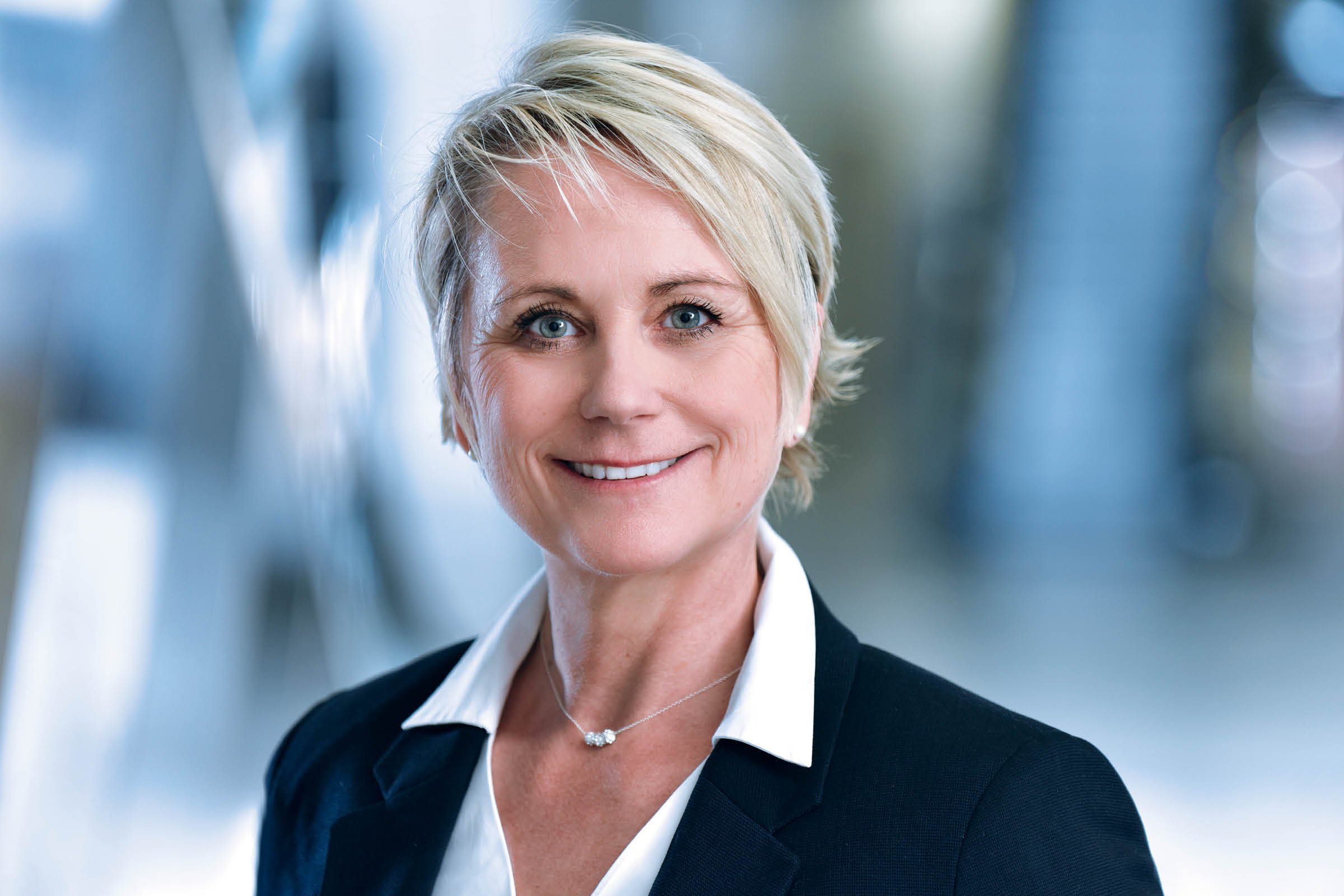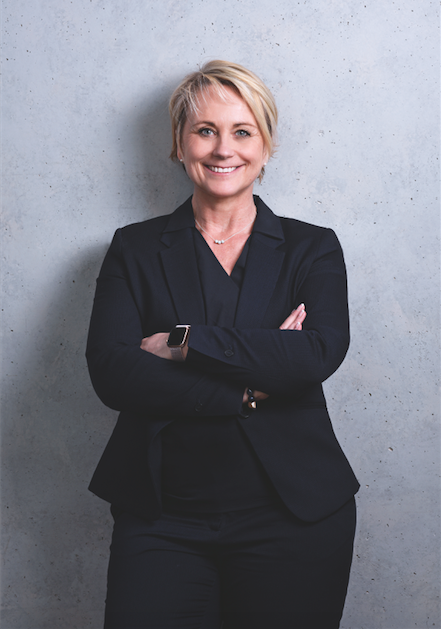The human touch: Margit Gosau
Margit Gosau’s many decades in the world of sportswear have taught her that brands and retailers succeed when they collaborate to build each other’s business. As CEO of Sport 2000, she is infusing every process in the company with her collaborative spirit.
In 2017, marketing and branding veteran Margit Gosau emerged from a series of jobs in the dynamic world of sportswear, looking for her next challenge. At Reebok, she headed product merchandise and marketing for Central Europe, which culminated in Adidas’s takeover of the company, giving her a deep look into two of the industry’s leading giants.

Next, at ECCO, she handled brand and retail development, devising a strategy for the 3,000 stores under one of Europe’s biggest golf brands.
After 25 years of climbing the ladder and pivoting between specialisations, she knew she was ready for the ultimate responsibility – becoming a CEO. Fortunately, that opportunity came from a company she knew well.
Both Reebok and ECCO were suppliers of European retail giant Sport 2000, so her appointment as CEO amounted to simply switching sides. "The reason I switched was because I saw enormous potential at Sport 2000. It is a very fine organisation," Margit says.
"I saw it as an opportunity to be completely focused on developing its retail business, online and offline, and also really fostering sports performance."
One of the fundamental assets she brought to her new post was her experience at ECCO, which had a remarkable focus on people and positive work culture. At Sport 2000, she identified fertile ground for a similarly open and vibrant atmosphere.
"Over the course of my career, I’ve come to the decision that I always want to have a people-focused approach to things, which I believe is one of my key strengths. We shroud our business in humanity and have very clear business ethics," she says.
"It’s all about people. It’s all about that human touch, and I think that’s what makes us completely different from other sport companies," she says.
Culture of collaboration
Margit’s vision for Sport 2000 was quickly embraced by the company’s board, who saw in her a strong leader who would "rally the troops around a change process". This meant forging stronger links between the company’s locations across Europe.
"In the past, people in the various national organisations worked a little bit on their own. They developed their own markets, and they didn’t look across borders very much," Margit recalls.

"My role as international CEO is to bring people together and to enable people to talk to each other and work with each other." She set up international working groups, each with the responsibility to implement a company-wide project.
"Whenever we develop a strategic lever or whenever we kick off a project, process or product, I bring the national organisations together with a consciousness that they are not alone.
We’re not alone in Germany, not alone in Switzerland, not alone in the Netherlands – we are a pan-European group of strategic heads working together and developing things together across the continent."
Sometimes, of course, the interests of one national organisation conflict with another’s and a decision must be made, for instance, about which product to develop, that will advantage one market and disadvantage the other.
By working with the consciousness of a single, pan-European unit, these conflicts are anticipated and not taken personally.
"At the end of the day, everybody can say, ‘that was not my number-one choice, but I will now treat it as my number-one priority.’ When we stop making business decisions from a country-level perspective, it becomes clear that we are seeking success on an international level. If something works for the entire organisation, then it inherently works for each national organisation,"
Margit says. Margit’s campaign to infuse Sport 2000 with collaborative spirit extends also to its relationship with their strategic partners.
Rather than simply ordering packages of products and marketing them each season – a relationship that involved little accountability – Margit sought to forge relationships in which Sport 2000 and its suppliers would collaborate to actively develop each other’s business.
"I looked at our relationships with every single individual brand we work with, and then I looked into how I could professionalise that – make it stickier. That led to reworking the entire approach to how we work with brands like Nordica, Asics, Under Armour and Puma in ways where we are all more reliable," Margit says.
The strategies that emerge from these revamped relationships do not always succeed on the first try, but Margit says the possibility of failure is mitigated by closeness and constant communication between Sport 2000 and its brands.
For instance, when sales of Puma products landed below expectations in the company’s Austrian stores a couple years ago, Margit organised a workshop there that brought together executives from both companies and gave them an opportunity to reassess their agenda and formulate a new plan for the future.
If people don’t want to talk to each other, I bring them together. I force them to talk with each other. At the end of the day, they will be good to each other.
"At the end of the day, we came out with a very clear plan for what we need to do in order to change the business. Now, the outcome is that business is growing. It’s been hard-fought, but we are now gaining back that growth in Austria," she says.
"It’s important for me to be somebody who is fostering a culture of the collaboration and transformation processes in our organisation. I’m looking for constant change and transformation, no matter if it’s digital transformation, people and culture, or if it’s bringing people together to collaborate. If people don’t want to talk to each other, I bring them together. I force them to talk with each other. At the end of the day, they will be good to each other. That’s what I’m really good at."
Margit’s approach has also been instrumental in attracting new partnerships, such as the recent addition of the running shoe brand Hoka One One to Sport 2000’s carefully selected cohort of strategic partners.
Margit says: "Hoka One One is an upcoming brand with lots of expertise and a high potential to become a leading specialist brand for performance running and outdoor. The partnership is a perfect match for the years to come since Sport 2000 is known for upmarket brand-driven performance sport with a high level of expertise. The mutual understanding of partnership was driven by respect and professionalism from the very beginning of our collaboration," she says.
Six levers of change
As crucial as it is, fostering collaboration is still just a single line item on the list of many changes Margit has instituted since she took over as CEO of Sport 2000. She refers to this list as the "strategic levers" that she intends to implement between now and 2025.
The first lever is brand enhancement, consisting mainly of assessing whether Sport 2000 carries brands that consumers can understand.
"Obviously, with a background in brand management, brand development and brand strategy, this was one of the first things I looked at when I joined in March 2017," she says.
"It is crucial for the consumer to understand the positioning of our brands in order to get them to come into our stores." The second lever is strategic partnerships – making sure Sport 2000’s stores carry the right offerings and have a relevant assortment strategy.
This process, too, benefits from the mechanisms Margit and her team have put in place to ensure synergy with Sport 2000’s strategic partners. The third lever is enhancing consumers’ shopping experience, both online and offline.
Margit says: "When I joined the company, I saw, in some cases, some fantastic, great-looking stores. But I also saw some very tired ones. We were not offering the right consumer experience for the prices we had set. We took a hard look at our stores and supplements and decided that we need to be really oriented towards sports performance. We see ourselves having the majority of all of the specialist retailers, whether it’s running specialists, outdoor specialists or team sports specialists."
The recent development of highly specialised franchises – such as Absolute Running and Absolute Teamsport – is the result of Sport 2000’s reimagining of retail brand attractiveness at Sport 2000 stores.
The next two levers cover supply chain efficiency and operational excellence, making sure the 3,555 stores in the Sport 2000 network are consistently stocked and managed professionally.
"Our operational excellence projects, single account models – meaning one order, one delivery, one invoice supply chain management solution – we are taking that further now and we are also looking into how we can do that on a collaborative level within the European set-up that we have," Margit says.
Finally, the last lever pertains to Sport 2000’s long-awaited online platform, which launched earlier this year. This is one component of a larger effort to expand the company’s digital footprint.
"Today, everything digital is becoming even more digital. What we want to bring to the digital world is the same human touch we already offer sports lovers offline. Digital experiences do not just exist for their own sake. The world is digital in order to enable people to live a better life. That’s my belief," Margit says.
Win-win relationships
With this ambitious set of projects and improvements already underway, Margit is confident that Sport 2000 is poised for growth. In the past two years, the company has seen more than €4 billion in annual revenue. As her plans solidify over the coming years, that number is sure to rise.
"Our role as a partner to sport retailers and sports industries is to develop the business in a professional way. Sport 2000 is a great brand, which is a stamp of quality on every retailer’s door who has a high level of service and expert advice with a human touch. This is what makes us unique and valuable for everyone who is a sports lover. In order to make this more visible and defined, I started a process right after I joined the brand to strengthen this unique and strong position and make it a real USP," Margit says.
I learned how to focus not only on my goals but to focus on win–win relationships instead.
Looking back on her long journey to becoming a CEO and the hurdles she has jumped in the years since, Margit reflects,
"I learned how to focus not only on my goals but to focus on win–win relationships as well. The eagerness to hammer things home is a typical mistake that young leaders make. Over years I learned to overcome this. Partnership is a give and take, and thus, I also learned how to confidently express my needs to reach my goals. When both parties are happy, there is more fun."
Proudly supported by: